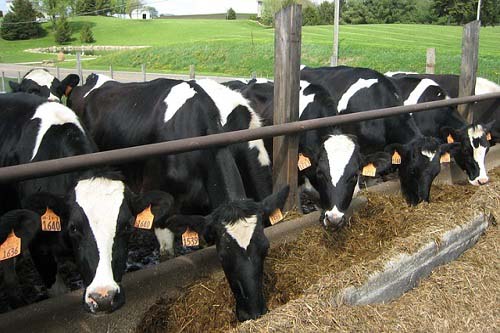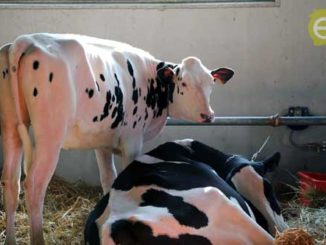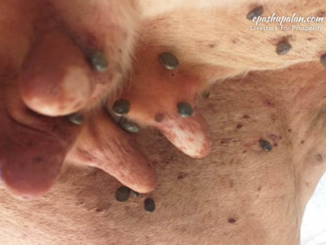Introduction
Minerals are crucial for the structural component of an animal’s body as well as the function of enzymes, hormones and minerals are also the essential components of bodily fluids, tissues, and regulators of cell division and differentiation. The reproductive performance of dairy animals is significantly influenced by nutrition, and nutrition and reproduction both are the most crucial factors in profitable dairy production. Mineral deficiencies, imbalances, and toxicity may result in animal reproductive diseases because minerals are crucial for the health, productivity, and reproductive efficiency of livestock.
Increasing dry matter intake (DMI), regulating carbohydrate fractions, maintaining adequate effective fibre, providing supplemental fats, avoiding excessive or inappropriate protein intake, maximizing mineral, and vitamin levels, and lowering the risk of known toxins are a few examples of nutritional management strategies to lessen the negative impact on reproduction. The minerals are major nutrients required after energy and protein and should be given priority to optimize reproduction in dairy cattle.

Minerals are classified into two primary categories, macro minerals, and micro minerals, based on their needs. The macro-minerals that must be present in diets in amounts more than 100 ppm are calcium, phosphorus, magnesium, potassium, sulphur, sodium, and chloride. The second group consists of trace or micro minerals, which are needed in amounts less than 100 ppm in an animal’s diet and include cobalt, copper, iodine, iron, manganese, selenium, and zinc. Mineral deficiencies or excesses may impair spermatogenesis, libido in male fertility, embryonic development, survival rate, post-partum recovery activities, milk production, and offspring development and survival.
Mineral supplementation such as Cu, Zn, and Mn resulted in acceptable artificial insemination pregnancy rates yet variation from year to year was recorded. Supplementation with complex trace minerals like Zn, Mn, Cu, and Co from day −30 to +30 of parturition leads to an increase in endometrial expression of genes associated with inflammation, prostaglandin synthesis, and antioxidant response.
Macrominerals
Calcium (Ca): To help with parturition, muscular contractibility, uterine muscle tone maintenance, and uterine involution, calcium plays a significant role in reproduction. Involution is delayed by low blood calcium levels, which can increase the risk of retained placenta, dystocia, and uterine prolapse. Depending on the stage of sperm maturation, Ca affects sperm viability and motility as well as antioxidant status by shielding sperm cells from oxidative damage. In periparturient animals, hypocalcaemia is a major factor in the decline in smooth muscle contraction, suppression of dry matter intake, increase in the mobilization of body fat in the form of non-esterified fatty acids, and reduction in neutrophil function, all of which contribute to an increased incidence of periparturient diseases. On a dry matter basis, the calcium-to-protein ratio for dairy cows should be 0.75 to 0.80 percent.
Phosphorus (P): A phosphorus deficiency is typically associated with inadequate ovarian function, irregular or anoestrous periods, and lower conception rates. Services per conception were reduced to 1.3 after adequate phosphorus supplementation. Phosphorus is stated to be one of the essential elements required for exhibiting normal sexual behaviour.
The main symptoms of phosphorus shortage include decreased fertility and diminished or delayed conceptions, which can be treated with adequate phosphorus supplementation. Conversely, a modest deficiency could result in recurring breeding issues and a low conception rate. On a dry matter basis, the ratio should contain a minimum of 0.45-0.50 percent phosphorus.
Potassium (K): After calcium and phosphorus, it is the third most prevalent mineral element in an animal body. The muscle of the female genital tract is affected by potassium deficiency, which is well recognized to produce muscular weakness, impairing the normal reproduction process. Feeding heifers, a diet high in potassium (5% DM basis) may delay puberty, postpone ovulation, hinder corpus luteum development, and increase anoestrus occurrence. About 3% is the highest level to be tolerated. Potassium requirement increases in diet with higher sodium and chloride level. The potassium requirement in tropical summer is increased as high as 1.9% for high-producing cows. The dairy cow’s minimum requirement for potassium is 0.90% to 1.0% of the ration on a DM basis (NRC 2001).
Microminerals
Zinc (Zn): Zn is important for the immune system and several hormones that control reproduction. Zn plays a crucial role in the maintenance and repair of the uterine lining after parturition, hastening the return to oestrus and regular reproductive activity. Zinc is necessary for the synthesis of testosterone and gonadotrophin-releasing hormone in mammals. It encourages the production of testosterone by the testis Leydig cells. In bulls, a Zn deficiency results in poor semen quality and reduced testicular size and libido. The direct effects of zinc on the cumulus-oocyte-complex and embryo may explain the positive correlation between zinc content and pregnancy rate by enhancing the viability of the pregnancy. According to in vitro research, Zn supplementation during oocyte culture reduced DNA damage and apoptosis in cumulus cells compared to those that were grown without Zn. More recent work found that the post-fertilization gamete is responsive to Zn as well. Zinc supplementation during the first 8 days post-fertilization resulted in an increase in inner cell mass (ICM) and total cell numbers, an indication of higher embryo quality. Supplemental Zn also reduced the number of days to the first AI but had no impact on days open. The requirement of Zn in the diet of dairy cows is near about 40 ppm.
Manganese (Mn): In general, grass and legume hays contain more Mn than maize or corn silage, thus hay is said to have a higher Mn availability than silage. Mn is also necessary for the production of the steroids testosterone, progesterone, and estrogen. Corpus luteum may also be affected by Mn deficiency. Insufficient steroid synthesis results in lower circulating concentrations of these reproductive hormones, resulting in defective sperm in males and irregular estrus cycles in females. Mn also has a vital role in reproduction and cholesterol synthesis. It protects bull spermatozoa from lipid peroxidation and oxidative stress, as well as facilitates capacitation and the acrosome response after ejaculation of semen, which is crucial in the fertilization of sperm with the oocyte. Gestating cattle may need up to 50 mg of Mn/Kg of DM because it helps in the skeletal cartilage and bone formation of the fetus.
Selenium (Se): In dairy animals, selenium insufficiency causes weak, silent, or irregular oestrus cycles, retained placentas, early embryonic deaths in foetuses, stillbirths or weak offspring, and abortions. Selenium supplementation helps reduce the number of reproductive issues in cattle, including retained placenta, stillbirth, aberrant estrous cycle, early embryonic mortality, cystic ovaries, and metritis. The testes have a high level of selenium, which is necessary for testicular function. Low sperm production and poor sperm quality, including reduced motility and flagella abnormalities primarily in the mid-piece, have consistently been observed in selenium-deficient animals. Both deficiency and excess Se have been reported to be detrimental to the normal spermatogenesis process. The dietary requirement of Se for most of the species is near about 0.1 ppm, but the revised requirement of Se for better immune response in dairy animals is 0.3 ppm.
Copper (Cu): Cu and Zn have a significant correlation with reproductive hormones i.e., progesterone and oestradiol. Its deficiency is supposed to be responsible for early embryonic death, & resorption of the embryo, increase chances of retained placenta and necrosis of placenta, and low fertility is associated with delayed or depressed estrus. In males, copper deficiency causes decreased libido, lower quality sperm, and marked destruction of testicular tissue, which can make the bull sterile. Copper supplementation is required for quality semen production in dairy calves at a level of 10 ppm whereas a level of 100 ppm is harmful to dairy cows. Feeding a total of 10 to 15 ppm copper in the ration dry matter or supplementing with 10 ppm copper should meet dairy cattle needs.
Iodine (I): Iodine is responsible for fetal growth and the maintenance of the body’s basal metabolism. It affects the thyroid gland, which has an impact on reproduction. Iodine deficiency symptoms include delayed puberty, suppressed or irregular oestrus, infertility, early embryonic death, stillbirth with frail calves, abortion, and an increased frequency of retained placenta in females, as well as a decline in libido and a decline in the quality of semen in males. iodine deficiency affects reproductive capacity, brain development, and progeny as well as growth. Lugol’s iodine is having beneficial effects in the treatment of silent oestrus, repeat breeding, and conception rate. Iodine supplementation recommended for cows is 15-20 mg of iodine each day. In ppm, the dietary requirement of iodine is 0.25 ppm.
Cobalt (Co): Infertility is a common side effect of debility problems brought on by severe Co deprivations through slowed general metabolism. Increased rates of silent heat, delayed puberty, non-functioning ovaries, and abortion are all linked to co-deficiency. Because vitamin B is a water-soluble vitamin that is generated by rumen microorganisms, ruminants need Co to meet the vitamin B requirements of both the host animal and the ruminal microbes. The depletion of Co and vitamin B at parturition through colostrum causes depressed milk production, colostrum yield, and quality. Cobalt deficiency in dairy cows causes reduced fertility, poor foetal conditioning, prolonged uterine involution, irregular estrous cycles, lower conception rates, and early calf mortality. The dietary cobalt requirement for lactating cows is 0.11 ppm. The recommendation for cobalt requirement in dairy cows varies between 0.10 mg/kg DM and 0.20 mg/kg DM.
Iron (Fe): Iron plays an important role in the synthesis of nucleic acids and proteins, electron transport, cellular respiration, proliferation, and differentiation which are involved in spermatogenesis and spermatozoa metabolism. The molecule acts as a readily available source of Fe for the developing spermatozoa while providing an extra layer of protection to the testicular tissue. Animals with low iron levels may become anaemic, which makes them repeat breeders, necessitates more inseminations for each conception, and occasionally may result in abortion. The dietary requirement for iron is 50 ppm.
Molybdenum (Mo): Molybdenum deficiency results in diminished libido, spermatogenesis, and sterility in males; delayed puberty, a lower rate of conception, and anoestrus in females. Because molybdenum is present in various feeds, molybdenum deficiencies are uncommon. Cattle and sheep are the least tolerant of molybdenum poisoning, and the dietary requirement for molybdenum is 10 ppm.
Chromium (Cr): The uterine endometrium secretes pregnancy-specific proteins that help avoid early embryonic mortality, and chromium is required for these proteins. Chromium has an impact on both LH release and follicular maturation. It may have an impact on embryonic growth and development as well as sperm count and fertility. The effect of insulin is potentiated by chromium by increasing the uptake of glucose and amino acids by the cells in the body, thereby improving the energy balance which in early lactation leads to improved reproduction.
Conclusion
For the improvement in the reproductive performance of domestic animals, it is necessary to ensure that the diet should contain all the essential nutrients. The minerals that affect reproduction in cattle are mostly found within the trace element group, although deficiencies of calcium and phosphorus can also affect fertility. Mineral requirement depends on various factors such as age, species, breed, and physiological condition of the animal. As described above, maternal health, reproductive performance, colostrum, milk quality, and offspring health, are all factors that are susceptible to mineral supplementation either directly or indirectly (alterations in enzymatic function, DNA replication, antioxidant formation, etc.). supplementation of minerals to meet normal growth, production, and reproduction requirement is of prime importance.






Be the first to comment